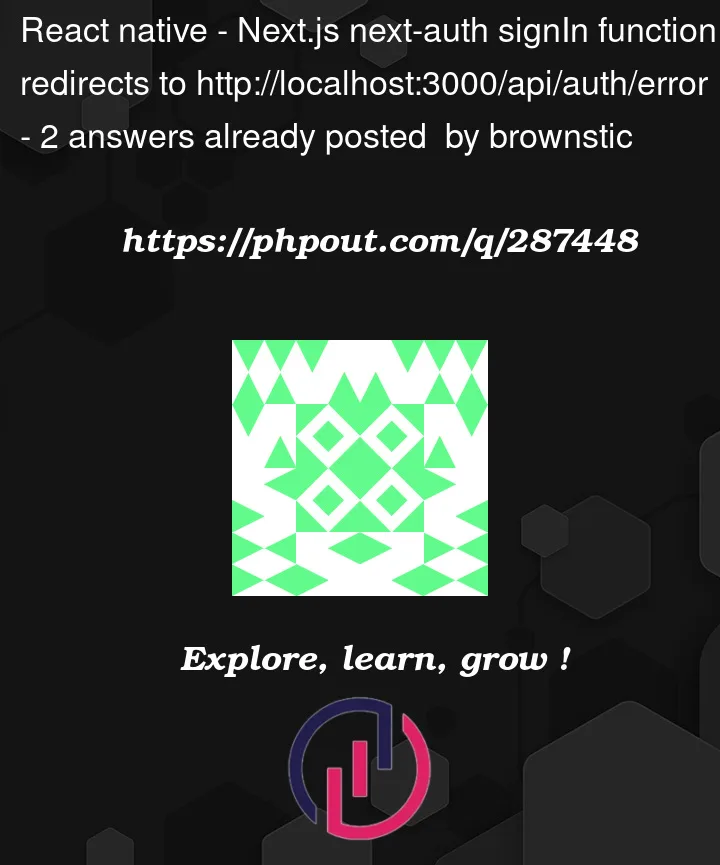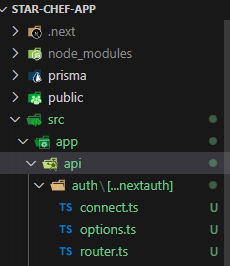Kinda new to next.js. Anyway am trying to add a login functionality in my react web app using next-auth in my local environment but whenever i tap the login button, it redirect to "http://localhost:3000/api/auth/error"
It should take me to google login page where i select which account to login with.
TO start off heres the structure:
Heres my LoginPage.tsx
"use client";
import { signIn, useSession } from "next-auth/react";
import Image from "next/image";
import Link from "next/link";
import { useRouter } from "next/navigation";
import React from "react";
const LoginPage = () => {
const { status } = useSession();
const router = useRouter();
if (status === "loading") {
return <p>Loading...</p>;
}
if (status === "authenticated") {
router.push("/")
}
return (
<div className="p-4 h-[calc(100vh-9rem)] md:h-[calc(100vh-9rem)] flex items-center justify-center">
{/* BOX */}
<div className=" h-full shadow-2xl rounded-md flex flex-col md:flex-row md:h-[70%] md:w-full lg:w-[60%] 2xl:w-1/2">
{/* FORM CONTAINER */}
<div className="p-10 items-center flex flex-col gap-8 md:w-[100%]">
<h1 className="font-bold text-xl xl:text-3xl">Welcome</h1>
<p>Log into your account or create a new one using social buttons</p>
// ISSUE IS HERE
<button
className="flex gap-4 p-4 ring-1 ring-[#213b5e] rounded-md"
onClick={() => {
signIn('google')}}
>
<Image
src="/google.png"
alt=""
width={20}
height={20}
className="object-contain"
/>
<span>Sign in with Google</span>
</button>
<button className="flex gap-4 p-4 ring-1 ring-[#213b5e] rounded-md"
onClick={() => signIn("github")}>
<Image
src="/facebook.png"
alt=""
width={20}
height={20}
className="object-contain"
/>
<span>Sign in with GitHub</span>
</button>
<p className="text-sm">
Have a problem?
<Link className="underline" href="/">
{" "}
Contact us
</Link>
</p>
</div>
</div>
</div>
);
};
export default LoginPage;
Heres my options.ts code
import { NextAuthOptions, User, getServerSession } from "next-auth";
import GoogleProvider from "next-auth/providers/google";
import GithubProvider from "next-auth/providers/github";
import { prisma } from "./connect";
declare module "next-auth" {
interface Session {
user: User & {
isAdmin: Boolean;
};
}
}
declare module "next-auth/jwt" {
interface JWT {
isAdmin: Boolean;
}
}
export const options: NextAuthOptions = {
debug: true,
session: {
strategy: "jwt",
},
providers: [
GoogleProvider({
// clientId: process.env.GOOGLE_ID as string,
// clientSecret: process.env.GOOGLE_SECRET as string,
clientId: process.env.GOOGLE_ID!,
clientSecret: process.env.GOOGLE_SECRET!,
}),
GithubProvider({
// clientId: process.env.GOOGLE_ID as string,
// clientSecret: process.env.GOOGLE_SECRET as string,
clientId: process.env.GITHUB_ID!,
clientSecret: process.env.GITHUB_SECRET!,
}),
],
secret: "PLACE-HERE-ANY-STRING",
};
export const getAuthSession = () => getServerSession(options);
My router.ts code
import { options } from "./options";
import NextAuth from "next-auth";
const handler = NextAuth(options);
export {handler as GET, handler as POST}
Heres my .env file code
# Environment variables declared in this file are automatically made available to Prisma.
# See the documentation for more detail: https://pris.ly/d/prisma-schema#accessing-environment-variables-from-the-schema
# Prisma supports the native connection string format for PostgreSQL, MySQL, SQLite, SQL Server, MongoDB and CockroachDB.
# See the documentation for all the connection string options: https://pris.ly/d/connection-strings
DATABASE_URL="postgresql://myuser:mypassword@localhost:5432/mydb?schema=public"
NEXTAUTH_SECRET=This is text
NEXTAUTH_URL=https://localhost:3000
GOOGLE_ID= 977467927902-trcb4gg3reqj34b6drhjs5novnftou12.apps.googleusercontent.com
GOOGLE_SECRET= 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
GITHUB_ID=f83f7e3e91fef7d3af71
GITHUB_SECRET=81432edd1610b06fe0aec444ce8c679e26f48f07
I tried other solutions of deleteing the api folder and recreating it, adding the NEXTAUTH_URL in the env file.
I also setup the google and Github Oauth client side correctly, Authorised redirect URIs i used
http://localhost:3000/api/auth/callback/google for google then
http://localhost:3000/api/auth/callback/github for github
I am using the ;astest versions of next-auth and next.js





2
Answers
Thanks to @oluwatowo-rosanwo comment
Deleting my .next folder and restarting my server made the signIn function now work. Just crazy.
The reason why you are getting Redirected is because you have not set custom auth pages as options to next-auth yet
in your options, add
With this Next auth will not redirect, when Authentication is not successful
also when calling signIn, make sure to add redirect : false if you do not want the page to refresh, with this response will contain the error and then you can display to user.
more info on custom auth pages here,
more info on redirect:false here